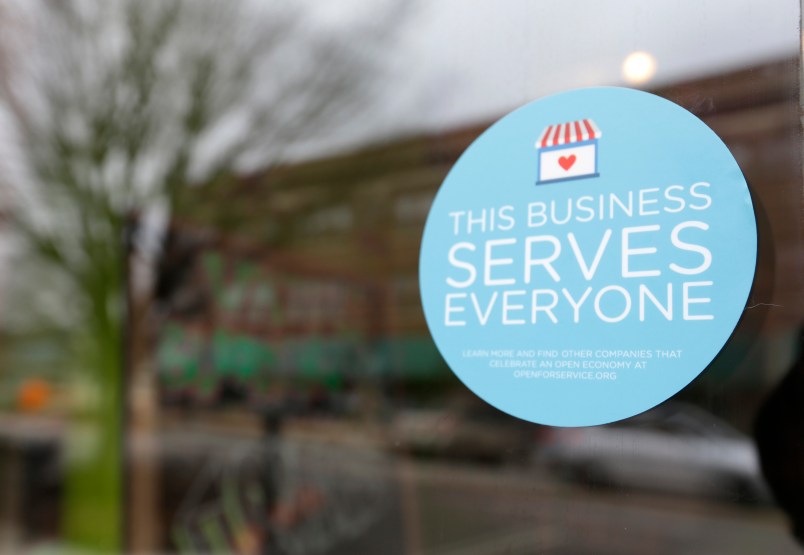INDIANAPOLIS (AP) — The heat over Indiana’s new religious objections law spread Friday across social media and to the White House as many local officials and business groups around the state tried to jump in and stem the fallout.
Use of the hashtag #boycottindiana spread across Twitter, spurred on by activists such as “Star Trek” actor George Takei, who argued that the measure opens the door to legalized discrimination against gay people. Apple CEO Tim Cook also tweeted his objections, saying he was “deeply disappointed” in the Indiana law.
Supporters of the bill that Republican Gov. Mike Pence signed Thursday say discrimination claims are overblown. They maintain courts haven’t allowed that to happen under similar laws covering the federal government and in 19 other states. The measure, which takes effect in July, prohibits state and local laws that “substantially burden” the ability of people — including businesses and associations — to follow their religious beliefs.
Some national gay-rights groups say lawmakers in Indiana and about a dozen other states proposed such bills this year as a way to essentially grant a state-sanctioned waiver for discrimination as the nation’s highest court prepares to mull the gay marriage question.
White House press secretary Josh Earnest on Friday noted the negative reaction to the Indiana law from many businesses and organizations around the country.
“The signing of this bill doesn’t seem like it’s a step in the direction of equality and justice and liberty for all Americans,” he said.
The Arkansas Senate approved a similar proposal Friday despite opposition from home-state retail giant Wal-Mart. Another measure stalled Thursday in the Georgia Legislature after opponents cited the fallout over the Indiana law.
Indianapolis Mayor Greg Ballard, a Republican who opposed the law, said he and other city officials would be talking to many businesses and convention planners to counter the uproar the law has caused.
“I’m more concerned about making sure that everyone knows they can come in here and feel welcome,” Ballard said.
Groups such as the Indiana Chamber of Commerce have taken to social media with messages that the state is full of welcoming businesses. Democratic South Bend Mayor Pete Buttigieg touted on Twitter his city’s civil rights ordinance’s protections for gays and lesbians, while Republican Evansville Mayor Lloyd Winnecke wrote that the law “sends the wrong message about Indiana.”
Stickers touting “This business serves everyone” have been appearing on business windows in many Indiana cities.
Pence, after signing the bill Thursday, said opponents had been mischaracterizing the measure and that it was solely a limit on government restricting people’s religious liberties.
Last year, Mississippi enacted a religious objection law just weeks after Arizona Gov. Jan Brewer, a Republican, vetoed a similar effort there amid criticism from major corporations. Mississippi hasn’t had any high-profile instances of the law being used by businesses to deny goods or services to gays.
Indiana University law professor Daniel Conkle, who testified in favor of the bill in Indiana legislative committees, said he was a supporter of gay rights and that the predictions of negative implications from the law were unjustified.
Conkle, who has written extensively on religious legal issues, said he didn’t know of any cases under the similar state laws or the federal statute, which dates to 1993, where a court had sided with a religious objector in a discrimination case.
“This ‘license-to-discriminate’ argument that seems to have this relentless repetition is just legally wrong,” Conkle said Friday. “It is as if you just keep repeating something often enough it takes on a life of its own.”
Chris Gahl, a vice president of Visit Indy, said the tourism agency was pointing out to convention planners that cities such as Chicago, New Orleans and St. Louis are in states that already have religious objections laws.
That’s part of protecting city’s tourism and convention business, which is estimated to have a $4.4 billion annual economic impact with some 75,000 jobs.
“We know that their ability to work is largely dependent on our ability to score convention business and draw in events and visitors,” Gahl said.
___
Associated Press writers Darlene Superville in Washington and Emily Wagster Pettus in Jackson, Mississippi, contributed to this story.
Copyright 2015 The Associated Press. All rights reserved. This material may not be published, broadcast, rewritten or redistributed.







What a surprise! Passing a law which says we endorse your right to inflict your bigotry on other people going about their daily lives has consequences? Who knew!
avoid indiana. do not travel to indiana. do not spend money with indiana businesses.
and to the good people of indiana, VOTE the hate-mongers out of office.
Well. I’m staying out of Indiana, despite a possible family wedding there in a year or two, and I’m boycotting any business that I find out does business in Indiana. Just my little personal protest.
Oh, please. There is only one reason for these laws and that is to allow religious bigots to refuse service to gay people. They started springing up as soon as courts recognized same sex marriage and few florists and bakers refused to serve gay couples. To pretend it is anything else is flat out lying. It’s going to cost a couple of Oregon bakers $150,000 because they refused to make a wedding cake for a lesbian couple.
“This ‘license-to-discriminate’ argument that seems to have this
relentless repetition is just legally wrong,” Conkle said Friday. “It is
as if you just keep repeating something often enough it takes on a life
of its own.”
Oh really?
Well, Mr. Conkle, you can dress this pig up as you will but it will still be a pig. The sponsors of this bill specifically touted the ability to use this legislation to legalized discrimination.